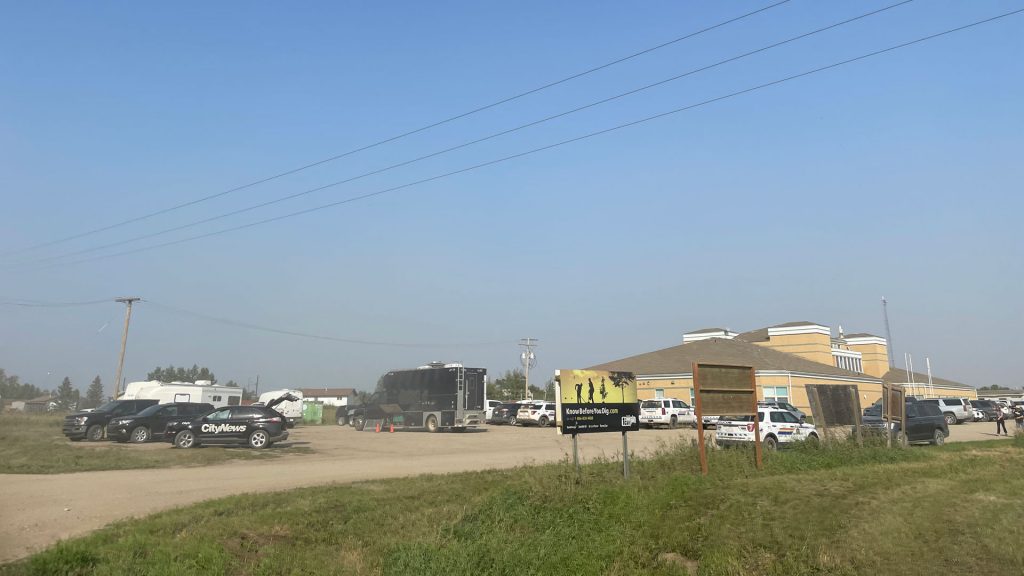
The meeting comes on the heals of a stabbing spree on Sept. 4. Photo: APTN.
Indigenous front-line workers and leaders are meeting in Toronto Friday with Mental Health and Addictions Minister Carolyn Bennett and Indigenous Services Minister Patty Hajdu to discuss the levels of mental health support that are needed in communities across the country.
The meeting, attended by dozens of First Nations, Inuit and Métis organizations, to “focus on sharing what is working to improve the mental wellness for First Nations, Inuit and Métis people, families, communities and populations,” comes in the wake of the Sept. 4 stabbing spree in James Smith Cree Nation in Saskatchewan that killed 10 people and injured 18 others.
The Nechi Institute joined a large Saskatchewan delegation in its call for more help to deal with the opioid addictions plaguing First Nations communities.
Marilyn Buffalo, CEO of the Alberta-based addictions training center, said there were some common messages shared with the federal ministers.
“There needs to be more government support for mental health workers, front line workers especially,” Buffalo told APTN News.
“Those of us that work with addictions and mental health issues. There need to be more trauma-informed workers, and measures to avoid burnout among those workers.”
Their message has been received according to Indigenous Services Minister Patty Hajdu, who said she’s been inspired by community leaders like Chief Mark Arcand from the Saskatoon Tribal Council.
“He said, ‘My job is to change systems,’” Hajdu told APTN News. “And he said ‘no more do we have systems that pat us on the head and say we’re taking care of Indigenous people,’ that time is gone.
“And he was very specifically talking about taking back what culturally works better, but also what is an inherent right, which is to care for people in culturally appropriate ways, and ways that have been designed by Indigenous people and ways that have been utilized since time immemorial.”
Hajdu said she’s been in ongoing discussions with James Smith Cree Nation since the tragedy there and one thing is clear.
“We’re not just talking about the urgent needs as they get through these first days of the crisis, we’re still in very early days,” she said. “But, also that we’re talking about the longer term recovery and helping the community have the supports and structures they need to begin to design what a health and wellness system looks like for James Smith Cree Nation. And that’s the hard work ahead.”
Mental Health and Addictions Minister Carolyn Bennett said another message they got was where the federal government should be allocating money in future budgets.
“I think one thing we heard very strongly is that if organizations are not Indigenous-led and have not had cultural competency training, they should not get any money from the federal government.”
According to the 2021 federal budget, “since 2015, the government has invested over $5.5 billion to improve health outcomes in Indigenous communities,” including mental health services.
Hajdu added that even with the cultural competency training, leaders don’t want organizations that aren’t Indigenous-led offering programming.
Marilyn Buffalo said she’s more optimistic following today’s discussions.
“We’re really hopeful that the change will come and it needs to come from the ground, I’m hoping that some of the representatives that are here from across Canada will be able to get their points across,” said Buffalo.
Meanwhile, she said she has offered the services of Nechi Institute to James Smith Cree Nation.
“We have reached out to Chief [Wally] Burns to offer our assistance and support,” she said. “While we don’t have a formal engagement contract in place with James Smith, we support his call for a treatment center.”
Buffalo said the invitation to the summit is the first time in her four years as CEO of Nechi Institute that the federal government has reached out to them.
“It’s been an uphill climb trying to get the government to support us,” Buffalo said.
The violence resulting from addictions has hit Indigenous communities hard.
Buffalo said she was actually headed for James Smith Cree Nation when she got word that her 27-year-old nephew had been murdered at Maskwacis in Alberta.
Jordy Buffalo Crier was found dead on the reserve on August 1st. The RCMP charged a 21-year-old man in the shooting death.
Buffalo said one of the James Smith victims, Gloria Burns, was an alumnus of Nechi Institute. She said she had planned to attend her funeral and offer support to the community.
“It is time that our leaders take the lead and invoke our own healing programs and services to all our people to help them heal,” she said.









